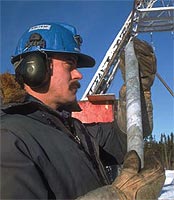
News |
- Environment Week May 31 to June 6
- UK Announces First Carbon Budget
- Obama Increases Science Funding
- Indigenous Peoples Prepare For Copenhagen
- California Adopts Low Fuel Carbon Standard
- Manitoba Invests $7 Million For Natural Areas
- Pope Apologizes for Residential Schools
- Ontario To Update Mining Act
- Commissioner Slams Climate Measures - Again
- Court Orders Canada to Report Mining Pollution
- Turning the Corner - Where's the Plan?
- Manitoba Boreal Lands Protection: NRDC
| Environment Week May 31 to June 6 | 25 May 09 |
 Celebrate Canada's natural environment while planning action to tackle climate change and other risks to our environment during Canada Environment Week. Take the time to make simple changes in your own lifestyle to contribute to a greener future for everyone. Find out what your community is doing and join in some of the hundreds of events planned across the country. A series of themes with dates are noted below: Celebrate Canada's natural environment while planning action to tackle climate change and other risks to our environment during Canada Environment Week. Take the time to make simple changes in your own lifestyle to contribute to a greener future for everyone. Find out what your community is doing and join in some of the hundreds of events planned across the country. A series of themes with dates are noted below:World Environment Day - June 5th Clean Air Day - June 3rd Oceans Day - June 8th Rivers to Oceans Week - June 8th to 14th Commuter Challenge - May 31st to June 6th View Community Action Board - Canadian Environment Week Events and Activities View World Environment Day 2009 View Clean Air Day 2009 View World Oceans Day 2009 View Rivers to Oceans Week 2009 View 2009 Commuter Challenge Sources: Environment Canada |
|
 Print version Print version |
Top |
| UK Announces First Carbon Budget | 25 May 09 |
 The United Kingdom is taking groundbreaking steps toward a low-carbon economy as part of a strategy to tackle climate change. Chancellor Alistair Darling announced a carbon budget in spring 2009 that aims to cut 34 percent of greenhouse gas emissions by 2020. The United Kingdom is taking groundbreaking steps toward a low-carbon economy as part of a strategy to tackle climate change. Chancellor Alistair Darling announced a carbon budget in spring 2009 that aims to cut 34 percent of greenhouse gas emissions by 2020.The legally binding emission targets are the first of their kind and will keep the UK on track towards its long-term goal of cutting emissions 80 percent by 2050. The carbon budgeting system caps emissions over five-year periods. Carbon budget levels have been released for the first 15 years. As part of the 2009 Budget, the government has promised significant investments in renewable energy, energy efficiency and sets out measures designed to help low-carbon industries. The Committee on Climate Change will revise the targets once the international agreement is reached at the UN climate change conference in Copenhagen, December 2009. View UK Budget 2009, Towards a Low Carbon FutureView UK Department of Energy and Climate Change - Carbon Budgets View April 22, 2009 Financial Times article View April 23, 2009 UPI.com article View April 24, 2009 The Guardian article Sources: UK Department of Energy and Climate Change, Financial Times, Guardian |
|
 Print version Print version |
Top |
| Obama Increases Science Funding | 25 May 09 |
 United States President Barack Obama called for massive increases in funding for science and engineering research with a primary focus on renewable energy development. In a speech to the National Academy of Science, Obama said it is "the largest commitment to scientific research and innovation in American history". United States President Barack Obama called for massive increases in funding for science and engineering research with a primary focus on renewable energy development. In a speech to the National Academy of Science, Obama said it is "the largest commitment to scientific research and innovation in American history". "Science is more essential for our prosperity, our security, our health, our environment and our quality of life than it has ever been before," said President Obama. Over the next decade, Obama has pledged to double funding for the Department of Energy's Office of Science, the National Science Foundation and the National Institute of Standards and Technology. View April 27, 2009 SEED Magazine articleView April 27, 2009 VOA News.com article View April 28, 2009 Science News article View April 27, 2009 The Washington Post article Sources: SEED Magazine, Science News, The Washington Post |
|
 Print version Print version |
Top |
| Indigenous Peoples Prepare For Copenhagen | 25 May 09 |
 Climate change has devastating impacts on Indigenous cultures, their human rights, well-being and traditional livelihoods. Delegates at the UN-Sponsored Indigenous Peoples' Global Summit on Climate Change called for Aboriginal rights to be included in any global climate change agreement. Climate change has devastating impacts on Indigenous cultures, their human rights, well-being and traditional livelihoods. Delegates at the UN-Sponsored Indigenous Peoples' Global Summit on Climate Change called for Aboriginal rights to be included in any global climate change agreement.Over 400 indigenous people from 80 countries met in Anchorage, Alaska to develop a final Declaration to be presented to the United Nations Framework Convention on Climate Change in Copenhagen, Denmark this December. John Crump, polar issues coordinator with the United Nations Environmental Programme, said indigenous rights will be recognized in any climate change protocols adopted by the United Nations. But specifics on how that would work have yet to be determined. View Indigenous Peoples' Global Summit on Climate Change - Anchorage DeclarationView April 27, 2009 CBC article View April 23, 2009 CBC article View April 20, 2009 CBC article View April 21, 2009 New Scientist article View April 22, 2009 Anchorage Daily News article View Northern Voices in the Global Climate webpage Sources: CBC, New Scientist |
|
 Print version Print version |
Top |
| California Adopts Low Fuel Carbon Standard | 25 May 09 |
 California has approved a Low Carbon Fuel Standard that aims to reduce carbon content of fuels 10 percent by 2020. The regulation is the first of its kind and would remove some 16 million metric tons of climate-changing carbon from the air over the next 11 years. California has approved a Low Carbon Fuel Standard that aims to reduce carbon content of fuels 10 percent by 2020. The regulation is the first of its kind and would remove some 16 million metric tons of climate-changing carbon from the air over the next 11 years.The California Air Resources Board adopted the standard to reduce carbon pollution, create a larger market for cleaner fuels and encourage innovation. Other U.S. states are following suit and committing to developing regional Low Carbon Fuel Standard. "With California's new fuel standard in place, and President Obama's recent announcement of mandated fuel efficiency standards, barriers to Manitoba's new fuel efficiency standard are gone. It's time for Manitoba to act," commented Gaile Whelan Enns, director of Manitoba Wildlands. The new California standard accounts for all carbon emissions created by extracting, growing, manufacturing, distributing and refining fuels. Environmental groups praise this comprehensive "well-to-wheel" approach for gasoline, diesel, and biofuels, including land and fertilizer intensive corn-ethanol. View May 19, 2009 CTV articleView April 23, 2009 NRDC article View January 14, 2009 Environmental News Network article View April 24, 2009 Green Biz article View California Energy Commission - Low Carbon Fuel Standard View California Full Fuel Cycle Assessment: Well-to-Wheels Energy Inputs, Emissions, and Water Impacts (PDF) Sources: NRDC, Environmental News Network, Green Biz, Manitoba Wildlands |
|
 Print version Print version |
Top |
| Manitoba Invests $7 Million For Natural Areas | 21 May 09 |
 Manitoba's government is investing $7 million to enhance protection of ecologically significant private lands in southern Manitoba over the next five years. Five ecosystem types are targeted for lands acquisition and protection. Manitoba's government is investing $7 million to enhance protection of ecologically significant private lands in southern Manitoba over the next five years. Five ecosystem types are targeted for lands acquisition and protection.Nature Conservancy of Canada (NCC) will raise matching funds from other government and private contributors for a potential benefit of $21 million for lands protection in Manitoba. The premier announced four initiatives including:
"This Earth Day announcement by Manitoba's government was welcome. We suggest that our government announce another $7 million to fulfill commitments for boreal forest regions protected areas establishment," commented Gaile Whelan Enns, director of Manitoba Wildlands. View April 22, 2009 Manitoba Government press releaseView April 22, 2009 Nature Conservancy of Canada press release View map of Nature Conservancy of Canada's priority work areas in Manitoba (PDF) Sources: Manitoba Government, Manitoba Wildlands |
|
 Print version Print version |
Top |
| Pope Apologizes for Residential Schools | 19 May 09 |
 Canada's Aboriginal leaders met recently with Pope Benedict XVI at the Vatican where he expressed his sorrow for Canadian Aboriginal children who suffered forced acculturation, and in some cases physical and sexual abuse, within residential schools, (75 percent being operated by the Catholic Church). Canada's Aboriginal leaders met recently with Pope Benedict XVI at the Vatican where he expressed his sorrow for Canadian Aboriginal children who suffered forced acculturation, and in some cases physical and sexual abuse, within residential schools, (75 percent being operated by the Catholic Church).An estimated 100,000 aboriginal children were taken from their families and forced to abandon language, customs and religion. The purpose of the visit with the Pope was to discuss the legacy of the Indian residential schools era and need for reconciliation. "We wanted to hear him say that he understands, that he is sorry, and that he feels our suffering, and we heard that very clearly," said Assembly of First Nation's grand chief Phil Fontaine, himself a former Indian residential school student. "Today's expression of understanding, acknowledgement and emotion by His Holiness, on behalf of the Catholic Church, closes the circle." Residential schools were established and paid for by the Canadian government, starting in the late 1800s, but were administered by various church organizations. The Canadian government, and the Anglican, United and Presbyterian churches have also all issued apologies. View April 27, 2009 National News North articleView April 27, 2009 Catholic News article View April 29, 2009 CBC article View April 29, 2009 Assembly of First Nations article Sources: Catholic News, Assembly of First Nations
Photo credit: Stephanie Jenzer/CBC |
|
 Print version Print version |
Top |
| Ontario To Update Mining Act | 19 May 09 |
 Ontario has proposed legislation to modernize its Mining Act. When passed, the legislation would provide clear rules for requiring mining companies to consult with First Nation communities and reduce environmental impacts of exploration. Ontario has proposed legislation to modernize its Mining Act. When passed, the legislation would provide clear rules for requiring mining companies to consult with First Nation communities and reduce environmental impacts of exploration.The province is working towards an approach that balances conservation, development objectives and Aboriginal and treaty rights. Aboriginal communities will be able to prohibit mining in areas considered sensitive, culturally significant, or areas that do not conform with their own land use plans. The legislation insures land use plans are in place before new mines are developed. The Liberal government has committed $40 million over three years for initiatives to support updating the Mining Act, building on commitments made last July to conserve more than 50 percent of Ontario's Far North region from development. View April 30, 2009 Boreal Canada articleView April 30, 2009 Ontario Government article View April 30, 2009 Ontario Government press release View April 30, 2009 Canadian Press article Sources: CBI, Government of Ontario |
|
 Print version Print version |
Top |
| Commissioner Slams Climate Measures - Again | 19 May 09 |
 The Canadian federal government has overstated greenhouse gas reductions expected from its climate change plans. Environment Canada, the department responsible, will be unable to determine actual emission reductions for the measures planned. The Canadian federal government has overstated greenhouse gas reductions expected from its climate change plans. Environment Canada, the department responsible, will be unable to determine actual emission reductions for the measures planned.The criticisms come from the Canada's 2009 Spring Report of the Commissioner of the Environment and Sustainable Development, tabled in the House of Commons May 12, 2009. The second chapter is an assessment of the government's climate change plans, as required under the Kyoto Protocol Implementation Act and notes in particular that:
The Pembina Institute, a non-partisan sustainable energy think tank, responded to the report by calling for Canada to signal to the world it is ready to move forward with an ambitious approach to emissions reductions. Pembina Institute urged Environment Minister Jim Prentice to initiate the legal process to cap Canadian emissions before the UN climate conference in Copenhagen, December 2009. View May 12, 2009 Office of Auditor General (Commissioner of the Environment and Sustainable Development) press releaseView Chapter 2, Kyoto Protocol Implementation Act, Spring 2009 Report of the Commissioner of the Environment and Sustainable Development View May 26, 2009 Canadian Press article View May 12, 2009 CBC News article View May 12, 2009 Pembina Institute press release View Manitoba Wildlands Canada Climate Initiatives View Manitoba Wildlands climate change reports service Sources: CBC, Commissioner of the Environment and Sustainable Development, Pembina Institute |
|
 Print version Print version |
Top |
| Court Orders Canada to Report Mining Pollution | 19 May 09 |
 The government of Canada must now report all toxic mine tailings data and waste rock from mining operations. Until now toxins such as mercury, sulphuric acid and arsenic, due to their interpretation of the Canadian Environmental Protection Act (CEPA) have not been reported. The government of Canada must now report all toxic mine tailings data and waste rock from mining operations. Until now toxins such as mercury, sulphuric acid and arsenic, due to their interpretation of the Canadian Environmental Protection Act (CEPA) have not been reported. The Federal Court of Canada ruled the government must publicly report mining pollution data from 2006 onward to the National Pollutant Release Inventory (NPRI). The national database details industrial and commercial pollutants released into the air, water and land. "The court has unequivocally upheld the right of Canadians to know when the health of their communities and environment is under threat from one of the country's largest sources of toxic pollution," said Ecojustice lawyer Marlene Cashin. Ecojustice filed the lawsuit in 2007 on behalf of Great Lakes United and Mining Watch Canada. The suit alleged the government broke the law by failing to collect and report pollutant information under the NPRI. Environment Minister Jim Prentice said the government will comply with the court's ruling. View April 24, 2009 CBC articleView April 24, 2009 Mining Watch Canada article View April 23, 2009 CBC backgrounder: Federal Court of Canada Reasons for Judgment (PDF) View National Pollution Release Inventory - Tracking Pollution in Canada View Federal Court Orders Publications of All Mining Pollution Data Sources: CBC, Mining Watch Canada |
|
 Print version Print version |
Top |
| Turning the Corner - Where's the Plan? | 19 May 09 |
 Canada's government released Turning the Corner, an aggressive plan to cut greenhouse gasses and air pollution, in April of 2007. Two years later Canada's total emissions continue to increase and the Canadian government has repeatedly missed deadlines for issuing needed regulations to implement the strategy. Canada's government released Turning the Corner, an aggressive plan to cut greenhouse gasses and air pollution, in April of 2007. Two years later Canada's total emissions continue to increase and the Canadian government has repeatedly missed deadlines for issuing needed regulations to implement the strategy.Leading environmental groups accuse Canada's government of failing to deliver a real plan. The latest national greenhouse gas inventory from Environment Canada, including data filed with the United Nations, showed emissions are on a significant growth trajectory and are 33.8 percent above Canada's Kyoto commitment. "Countries are working hard to complete a new global climate treaty by year's end, but Canada is still coming to the table empty-handed," adds Matthew Bramley, climate change director with The Pembina Institute. Environment Minister Jim Prentice says the government will reveal the regulations sometime before the UN conference in Copenhagen December 2009. The U.S. Environmental Protection Agency is taking significant steps to regulate emissions while debate rages about a US cap and trade system. The Australian government is planning to implement a cap-and-trade system, while Britian is beginning annual carbon budgets. View April 27, 2009 Climate Action Network Canada articleView April 24, 2009 Climate Action Network Canada article View April 22, 2009 Canada.com article View March 2008 Environment Canada report, Turning the Corner: Regulatory Framework for Industrial Greenhouse Gas Emissions (PDF) View May 16, 2009 Toronto Star article Sources: Climate Action Network Canada, Canada.com |
|
 Print version Print version |
Top |
| Manitoba Boreal Lands Protection: NRDC | 11 May 09 |
 Indigenous communities have identified conservation opportunities all across Canada's boreal forest and Poplar River First Nation in Manitoba has been at the forefront of this vision. Indigenous communities have identified conservation opportunities all across Canada's boreal forest and Poplar River First Nation in Manitoba has been at the forefront of this vision. The time has come for Manitoba to grant permanent protection of the Asatiwisipe Aki Traditional Lands under the Manitoba Parks Act, as requested by the Poplar River First Nation in 1999 and 2005. These boreal traditional lands are also part of a potential 10.6 million-acre World Heritage Site (WHS) in Manitoba and Ontario. The WHS site would include two provincial parks in addition to the traditional territories of involved First Nations. Poplar River First Nation -- the first community to complete its land use plan -- is still waiting to have its decision to permanently protect two million acres of this pristine boreal forest confirmed. Take Action and Tell the Manitoba government to grant permanent protection to lands in the Heart of the Boreal ForestView NRDC Biogem, Heart of the Boreal Source: NRDC |
|
 Print version Print version |
Top |


 RSS Feeds:
RSS Feeds: